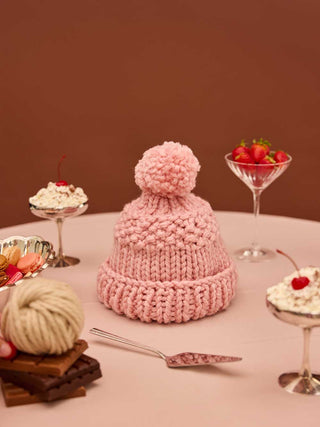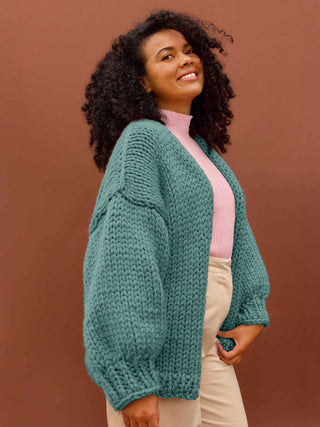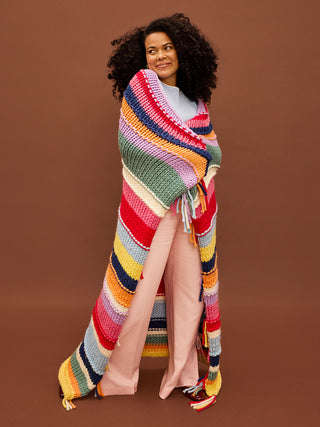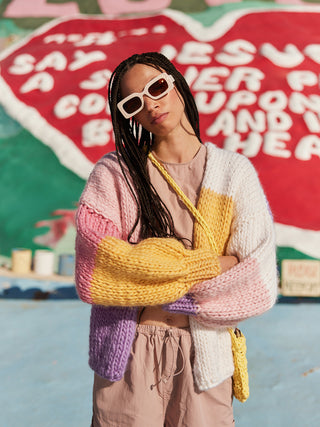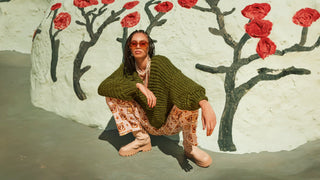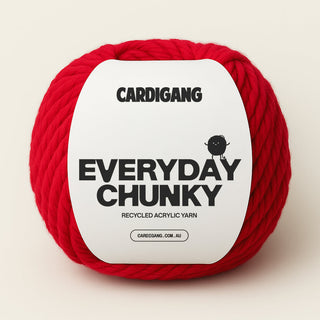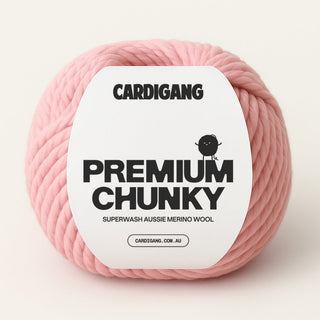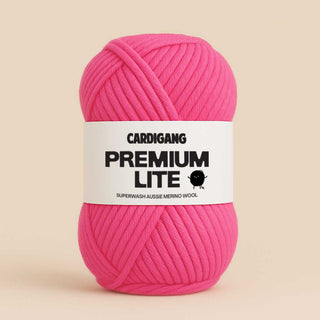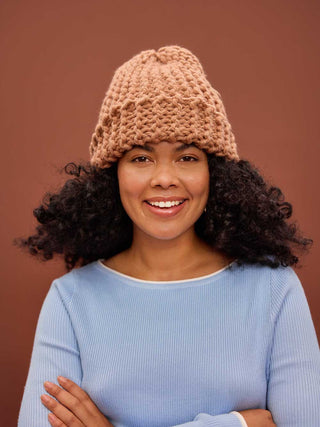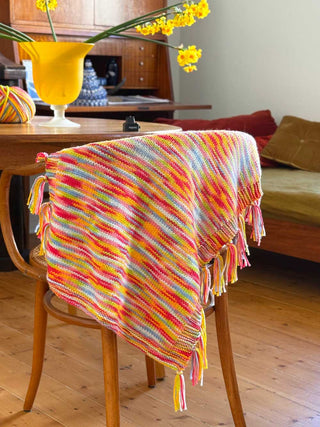A step by step guide to knitting the Bobbie T-Shirt.
Ever gotten half way through a project and thought “Hang on, am I even doing this right?”
We have 🙋♀️
Learning to knit can feel like learning code which is why we've stripped away the complicated jargon and tried to keep things simple. We’ve created these step by step overviews to help guide you through the knitting process. At each stage we’ll show you how each section of your piece should look, and at the end, how to sew it all together. Voilà!
THE BASICS
If you're a total knitting newbie - WELCOME! 🧶 Before we get started on the pattern it’s a good idea to learn the basic stitches you’ll need to complete your masterpiece. You can use the yarn that came in your kit to practice with, just be gentle with the yarn - it’s super fine so will break if it’s worked too hard or too many times. We’ve put the below video together to cover the basics. Learn how to cast on, do a knit stitch, a purl stitch and put them together to create a 1x1 rib stitch, lastly we learn casting off. Once you've got these mastered you'll find this pattern is a cinch!
💭 For more detailed videos of each technique, head down a little further where we've got specific videos for each stitch type.
🏅🧶 You got this! ⚡️💪
Remember learning a new skill can be a little hard at first and you’re bound to find yourself making some mistakes along the way. But as with learning anything, your brain and your hands slowly start to get the hang of it, muscle memory is created, and soon the thing you found tricky/daunting/scary is like second nature!
If you get stuck, reach out to us and we'll give you a hand! 😎
TEST YOUR TENSION
It’s a good idea to check that the tension (how tightly or loosely your knitting is) is in line with what we need. We knit a “tension swatch” to make sure the tension is juuuust right. It's a bit like goldilocks, if the tension is too tight, your jumper will be too small, and if it's too loose it may not hold it's shape and might be too big.
If done correctly, your 10x10cm knitted swatch should be 7 stitches high and 9 rows wide. To test this, jump on your needles, cast on around 12 stitches, then knit in stockinette stitch (row 1 knit, row 2 purl) for around 10 rows. Then get a measuring tape and measure out 10x10cm and count your stitches and rows to make sure you're knitting at the correct tension.
SIZING
You can knit the Bobbie in two sizes, size small/medium and size large/extra large. Your pattern is read like this: S/M (L/XL).
MEASUREMENTS
Lying flat your finished piece will measure:
📏 Size S/M: 67cm wide x 43cm high
📏 Size L/XL: 77cm wide x 50cm high
WHAT YOU’LL NEED
Your kit comes with everything you need to knit your masterpiece. To knit Bobbie you’ll use;
-
12mm circular needles - we use these for the rib at the bottom, around the arm holes and on the v-neck
-
15mm needles - these are to knit the body of your tee
-
3 x balls of colour 1
-
1 x ball each of colour 2 and 3
-
Darning needle - this is used to sew your masterpiece together and weave in loose ends
THE TECHNIQUES YOU’LL MASTER
CASTING ON
We recommend using the two needle technique. Two needle cast on uses your two needles (surprise!), starting with a slip knot on your left needle, each stitch is knitted to form a new loop and this loop is then added to your left needle. You repeat until you’ve made the desired number of stitches. To see casting on in action watch our "Master The Basics" video above.
💭 Casting on, like many things in knitting, can be done in a number of ways - our suggestion is a simple technique but you can pick any that’s right for you.
KNIT STITCH
This handy little stitch makes up the backbone of most knitting patterns. Each knit stitch looks like a little ‘v’.
PURL STITCH
The second most common stitch, purl stitches look like little bumps (or purls!). Where you knit a knit stitch with your yarn tail at the back of your work and your needle going into the back of the stitch, the purl is the opposite, so your yarn tail is at the front of your work and your needle goes into the front of the stitch.
STOCKINETTE STITCH
Stockinette Stitch (or stocking stitch) is a basic stitch that most knitting patterns often don't explain! When knitting flat, you create stockinette stitch by knitting one row and purling the next. This means all of your knit stitches (the little Vs) will be on the right side of your jumper.
SEED STITCH
Seed Stitch is a common, easy stitch pattern in knitting. It is made by alternating knit stitches and purl stitches within a row and between rows. It is called seed stitch because the stitches create little bumps that may look like seeds. Seed stitch is identical on both sides and lies flat.
RIB STITCH
1x1 rib stitch is a textured pattern usually used on the cuffs and necks of jumpers. It’s made by alternating knit and purl stitches in the same row, then knitting the same stitch sequence in the next row. When doing your rib stitch it’s important to make sure your yarn is on the correct side of your needles (at the back for knit stitches and at the front for purl stitches). To see rib stitch in action watch our "Master The Basics" video above.
KNITTING IN THE ROUND
Knitting in the round is where we use our circular needles and knit continuously in loops, rather than back and forth in rows (like a lot of beginner patterns do). Now don't worry! It's not anywhere near as hard as it sounds. When knitting in the round, you're always knitting on the "front" side of your work so you don't need to turn the piece to knit on the "back" side. Plus, you don't need to sew your pieces together at the end!
CASTING OFF
To cast off, knit two stitches then slip the first stitch on your right needle back over the second stitch and off the needle. You’ll have one stitch left on your right needle. Knit another stitch so you’ve got two stitches on your right needle and then slip the first stitch off. Continue to the end of the row. When you’ve got the last stitch on your right needle, cut the yarn and thread this through the final stitch to secure. To see casting off in action watch our "Master The Basics" video above.
OKAY, LET’S KNIT UP A STORM!

BACK & FRONT
We start with the back and front panels which are identical so follow the instructions twice! We knit from the bottom up using our 15mm needles and working through the colour changes and the split as we create the 'v' shape for the neckline.
Step 1:
Cast on the required number of stitches using your 15mm needles and colour 1 yarn.
Step 2:
We get the checkered pattern by knitting multiple colours into the one row. We'll change colours twice in each of these rows. For row 1, knit following the pattern instructions.
Step 3:
From now on, every time we use colour 1, we are knitting in seed stitch. This excludes the first row of each colour change.
So for row 2, we are going to be purling our stitches (except when we knit with colour 1!). Follow the pattern and change colours where instructed.
Step 4:
Row 3, we'll knit stitches.
Step 5:
Repeat rows 2 to 3 to knit up the first band of colour blocks.
Once you've finished the first three patches/blocks of colours we're going to change up the colour order to create the contrast blocks above.
Step 6 - 9:
Follow the pattern to continue knitting up the colour blocks. Remember colour 1 is knitted in seed stitch except for the first row of a colour change.
Step 10 - 11:
Are you ready for this?! We're going to start splitting the panel into two sides so we create the v-neck shape. The middle block of colour in this band will now be split in half as we knit up.

Knit, purl your allocated number of stitches in colour 1. Change to colour 3 and we're going to knit just 6 (7) stitches. Then we'll flip our work and knit, purl these same stitches again. The other stitches will sit on your needle until we're ready to knit them.
Step 12 - 15:
Continue knitting as instructed in the pattern.
Step 16:
Cast off your stitches for shoulder one! Time to knit up the second shoulder.
Step 17:
We're going to rejoin our yarn by tying a knot to the base of the stitch closest to the tip of your left needle. It'll look a little something like this...

Once you're re-attached you simply follow the pattern to complete the second shoulder.
SEW YOUR SHOULDERS
Time to join your front and back panels so we can get started on the ribbing! Lay your pieces on a flat surface facing upwards. Using your darning needle, sew the shoulder seams together using the mattress stitch technique. We cover that technique in the video below.
ARMHOLE RIBBING
Okay, now we're onto the ribbing section. For this part you'll grab your 12mm circular needles and we're going to knit in sections, starting with the arm holes.
Step 1:
Using your 12mm circular needles and colour 1, pick up an even number of stitches around the side panels - start from the bottom of your front or back panel and work your way around. It's important that you evenly space the stitches and that you have an even number of stitches on your needle. Aim to pick up a stitch for every row.
Step 2:
We're going to do 7 rows of 1x1 rib stitch - knitting back and forth to create the rib. Remember to create a rib we knit 1 stitch, then purl the next. Make sure you’re moving your yarn tail from the back to the front of our stitch to ensure the stitch is executed correctly.
Step 3:
Cast off those stitches and repeat for the second arm hole! 💪😎
SEW YOUR SIDES
Pick up that darning needle again! We're going to sew the sides together now. We sew this from the bottom up and we're sewing a length of about 10cm so we have enough space for the arm holes.

BOTTOM HEM RIB
We knit this part in the round which means we use our circular needles and knit in loops instead of rows.
When we knit in the round it’s important to make sure that you connect your stitches in a loop when you knit your first row.
💭 Make sure you use a stitch marker to keep track of the number of rows/loops you’ve knitted. A stitch marker can be anything round; a ring, hair tie or a spare piece of yarn.
Step 1:
Pick up an even number of stitches from around the bottom hemline.
Step 2:
We're going to knit 5 (6) loops of rib stitch in colour 2.
Step 3:
Cast off. We're getting good at this now! 🥳🔥 Celebrate with a wine?! 🍷
V-NECK RIB
We're SO CLOSE! I can see the finish line 🎢🙌
Our neckline has 2 V's rather than one (like you'd see in a typical vest pattern). That means that we have two points we need to shape as we knit the rib.
Step 1:
Pick up an even number of stitches, one for each row, around the neckline. Make sure you pick up a stitch at the bottom point of each V.
Step 2:
Use a spare piece of yarn or a stitch marker to mark the two stitches at the bottom of the V's. Then also mark the beginning the loop.
Step 3:
Okay, time to start knitting in 1x1 rib stitch. We want the stitches at each V to be a knit stitch, that means we need to count back from the first 'V' we'll knit (knit, purl, knit, purl...) so we know if we need to start our rib with a knit or a purl stitch.
Complete 1 loop of rib stitch.
Step 4 - 5:
Continue your second loop until you get to one stitch before your first marked center V stitch. Slip your needle through two stitches as though you're going to knit them, then slip them onto your right needle. Knit your next stitch. Then slip those two previous stitches back from your right needle (over the knitted stitch) and onto your left needle. Then continue knitting your rib stitch until you get to your second V. We're going to repeat that same technique - slip two stitches (the marked center V stitch and the one previous) from your left to your right needle. Knit a stitch. Then slip those previous two stitches back onto your left stitch. Then continue knitting in rib stitch until you complete the loop.
Step 6:
Repeat steps 4 to 5 another 4 times - that means we'll knit 4 more loops of rib.
Step 7:
Cast off your stitches! 🙌🥂
The last thing we do for every piece is weave in the ends. That’s basically just tidying up the piece so all loose ends are trimmed down and tucked in.
We'd LOVE to see how you go! Share your masterpiece with us by tagging @cardigang_knits on Instagram or by sending us an email at hello@cardigang.com.au
Until next time! 😘🧶💕
Morgan & Cat xx


